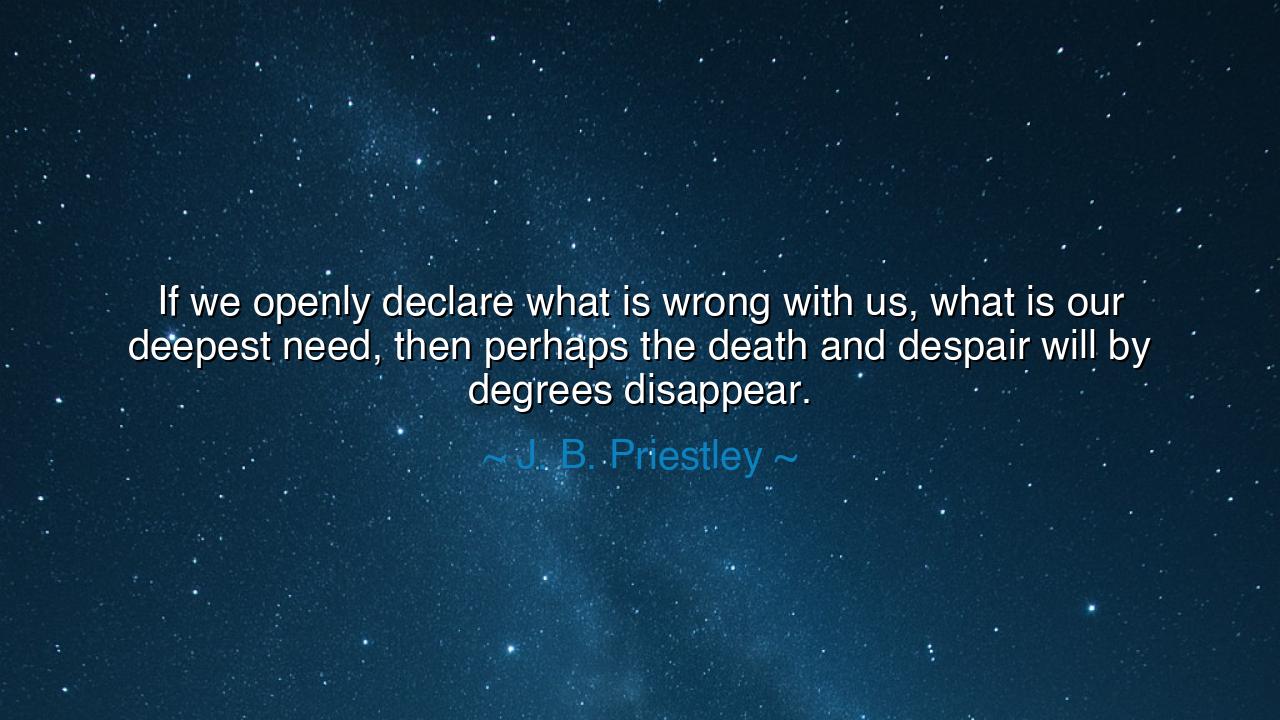
If we openly declare what is wrong with us, what is our deepest
If we openly declare what is wrong with us, what is our deepest need, then perhaps the death and despair will by degrees disappear.






“If we openly declare what is wrong with us, what is our deepest need, then perhaps the death and despair will by degrees disappear.” Thus spoke J. B. Priestley, a man who walked through the dark valleys of war and the weary hours of a world divided, and yet believed in the quiet redemption of truth. In these words lies a profound and healing wisdom: that confession is the gateway to renewal, that honesty is the first breath of freedom, and that in the humble act of revealing our pain, the seeds of hope begin to stir once more.
Priestley lived in an age when humanity had seen its own shadow—when the fires of war had burned not only cities, but the human spirit itself. Out of that desolation, he learned what many had forgotten: that silence breeds despair. Men who hide their wounds behind masks of pride or indifference slowly decay within, their souls suffocating under the weight of unspoken sorrows. Yet when one dares to speak, to name the grief, the guilt, the longing, the world changes. The air grows lighter. The chains loosen. Truth, once spoken, begins the work of healing.
There is an ancient tale of a king who was gravely ill. None of his physicians could cure him, for his sickness was not of the body, but of the spirit. One day, a simple monk came to him and said, “You are burdened not by illness, but by silence. Confess what haunts you, and you will be well.” The king hesitated, ashamed of his secrets. But when at last he spoke them aloud, tears fell from his eyes like rain upon dry earth—and from that day, his strength returned. So it is with all men and women: the hidden sorrow becomes poison, but when released into light, it becomes wisdom.
Priestley’s insight reaches beyond the personal—it is also a remedy for nations and generations. For what is a society, if not a reflection of the hearts that compose it? When nations hide their injustices, when people bury their shared pain, when truth is silenced, death and despair multiply. But when voices rise to declare, “Here is our wound,” then the slow work of healing begins. Truth spoken in courage becomes the dawn after a long and merciless night.
In the twentieth century, after the horror of the Second World War, there came a movement among survivors and witnesses to speak their truth, to bear witness to what had been done. Through their testimonies, humanity was confronted with its own darkness—and though the pain was immense, it was through that speaking that dignity began to return. This was Priestley’s faith made visible: that to name what is wrong is not to dwell in weakness, but to reclaim the power to live.
The same is true in our own time. Too many hearts suffer in silence, fearing judgment or shame. Yet Priestley’s words call to us across the decades: “Speak, and you will be freed.” To say aloud, “I am lonely,” or “I am afraid,” or “I need help,” is not to admit defeat—it is to invite compassion, to allow the light of others to enter our darkness. As the ancients taught, the wound must be washed before it can heal, and truth is the cleansing water of the soul.
The lesson is this: let no man or woman carry their pain in secret. Speak it. Share it. Seek understanding, not perfection. In families, among friends, in the quiet of communities, let there be no shame in being human. For what binds us together is not our strength, but our shared need for mercy. When we open our hearts, death and despair retreat, and life begins to breathe again.
Therefore, O seeker of peace, remember Priestley’s counsel: declare what is wrong, not as confession of weakness, but as an act of courage. Speak truth as a lantern in the night, for in the light of honesty the shadows lose their power. The voice that trembles with pain today becomes the song that heals tomorrow. And when the truth is spoken by many, the world itself may yet awaken from its long and weary sleep.






AAdministratorAdministrator
Welcome, honored guests. Please leave a comment, we will respond soon